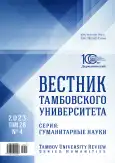Competences of specialized translation / interpreting trainers in the contemporary environment
- Authors: Stepanova M.M.1, Sbrodova O.A.1
-
Affiliations:
- Moscow State Institute of International Relations of the Ministry of Foreign Affairs of the Russian Federation
- Issue: Vol 28, No 4 (2023)
- Pages: 845-857
- Section: THEORY AND METHODS OF FOREIGN LANGUAGE TEACHING
- URL: https://bakhtiniada.ru/1810-0201/article/view/298013
- DOI: https://doi.org/10.20310/1810-0201-2023-28-4-845-857
- ID: 298013
Cite item
Full Text
Abstract
Importance. We analyzed and ranked the competences of a specialized translation / interpreting trainer required in the rapidly changing world with the ever-evolving translator/interpreter job duties. The purpose of this study is to support specialized translation / interpreting trainer curriculum developmentand upgrades for university degrees and further education programs.Research Methods. We analyzed the regulations and performed anonymous online surveys with Google Forms. The survey results were averaged and ranked.Results and Discussion. We identified 21 translation / interpreting and teaching skills and knowledge components. Then we surveyed the translation trainers to assess the significance of each component. The survey results were ranked to obtain a list of the 10 most relevant skills and knowledge components.The top ones are translation and translation editing, translation assessment and providing a rationale for it, and knowing how to teach translation and / or interpreting. These are the key competences for the specialized translation / interpreting trainer.Conclusions. This study shows that the specialized translation / interpreting trainercompetences include the translator / interpreter competences, common university-level teaching competences, and specific translation / interpreting teaching competences.
About the authors
M. M. Stepanova
Moscow State Institute of International Relations of the Ministry of Foreign Affairs of the Russian Federation
Email: m.stepanova@odin.mgimo.ru
ORCID iD: 0000-0003-0444-8155
PhD (Education), Associate Professor of English Language Department
76 Vernadskogo Ave., Moscow, 119454, Russian FederationO. A. Sbrodova
Moscow State Institute of International Relations of the Ministry of Foreign Affairs of the Russian Federation
Author for correspondence.
Email: sbrodova_o_a@my.mgimo.ru
ORCID iD: 0009-0002-6800-8415
MA (Education), Educational Programs Support Specialist
76 Vernadskogo Ave., Moscow, 119454, Russian FederationReferences
- Aleksandrova E.M., Berendyaev M.V., Vasil’eva K.A. et al. (2019). Perevod i lokalizatsiya: opyt razrabotki professional’nogo standarta [Translation and Localization: Experience in Developing a Professional Standard]. Krasnoyarsk, Siberian Federal University Publ., 140 p. (In Russ.) https://elibrary.ru/zaypjr
- Petrova O.V. (2021). How to build a retraining program for translation teachers. Yazyk. Kul’tura. Kommunikatsiya = Language. Culture. Communication, no. 23, pp. 66-27. (In Russ.) https://elibrary.ru/pdhnwz
- Tareva E.G. (2012). Translator and interpreter (T & I) educators: steps of professional skills development. Journal of Siberian Federal University. Humanities and Social Sciences, vol. 5, no. 6, pp. 889-896. https://elibrary.ru/oyqwej
- Kryukova T.V. (2003). Metodicheskaya sistema podgotovki studentov po spetsial’nosti «Prepodavatel’ perevoda» v yazykovom vuze (na materiale angliiskogo yazyka): avtoref. dis. ... kand. ped. nauk [Methodological System of Training Students in the Specialty “Teacher of Translation” in a Language University (on the Material of the English Language). PhD (Education) diss. abstr.]. Moscow, 21 p. (In Russ.) https://elibrary.ru/znosft
- Sdobnikov V.V., Shamilov R.M., & Shlepnev D.N. (2022). The basic requirements to translator trainers competence. In: Amiryanovna N.L. (ed.). Proceedings of the 10th International Conference “Word, Utterance, Text: Cognitive, Pragmatic and Cultural Aspects”. Chelyabinsk, Chelyabinsk State University Publ., vol. 86, pp. 1227-1236. https://doi.org/10.15405/epsbs.2020.08.141
- Kelly D. (2008). Training the trainers: towards a description of translator trainer competence and training needs analysis. Traduction, Terminologie, Rédaction, vol. 21, no. 1, pp. 99-125. https://doi.org/10.7202/029688ar
- Chubykina O.V. (2009). Professional’nye kompetentsii prepodavatelya perevoda kak metodicheskaya problema [Professional competencies of a translation teacher as a methodological problem]. Aktual’nye problemy gumanitarnykh i estestvennykh nauk [Current Issues of the Humanities and Natural Sciences], no. 3-1, pp. 120-123. (In Russ.) https://elibrary.ru/kpsvbj
- Shlepnev D.N. (2021). On some aims and principles that novice translator trainers should bear in mind. Kognitivnye issledovaniya yazyka = Cognitive Studies of Language, no. 3 (46), pp. 917-921. (In Russ.) https://elibrary.ru/rvvzqm
- Shlepnev D.N. (2020). Obshchaya model’ kompetentsii prepodavatelya perevoda: vozvrashchayas’ k voprosu [The general model of the competence of a translation teacher: returning to the question]. In: Ivanov A.V. (executive ed.). Sbornik tezisov 4 Obshcherossiiskoi nauchnoi onlain-konferentsii s mezhdunarodnym uchastiem «Perevod i kul’tura: vzaimodeistvie i vzaimovliyanie» [Proceedings of Theses of the 4th All-Russian Scientific Online Conference with International Participation “Translation and Culture: Interaction and Mutual Influence”]. Nizhny Novgorod, Nizhny Novgorod Dobrolyubov State Linguistic University Publ., pp. 15-17. (In Russ.) https://elibrary.ru/rlspse
- Gavrilenko N.N. (2019). Interdisciplinary approach to teaching industry-specific translation. Voprosy metodiki prepodavaniya v vuze = Teaching Methodology in Higher Education, vol. 8, no. 29, pp. 12-23. (In Russ.) https://doi.org/10.18720/HUM/ISSN2227-8591.29.01, https://elibrary.ru/phvtoe
Supplementary files









